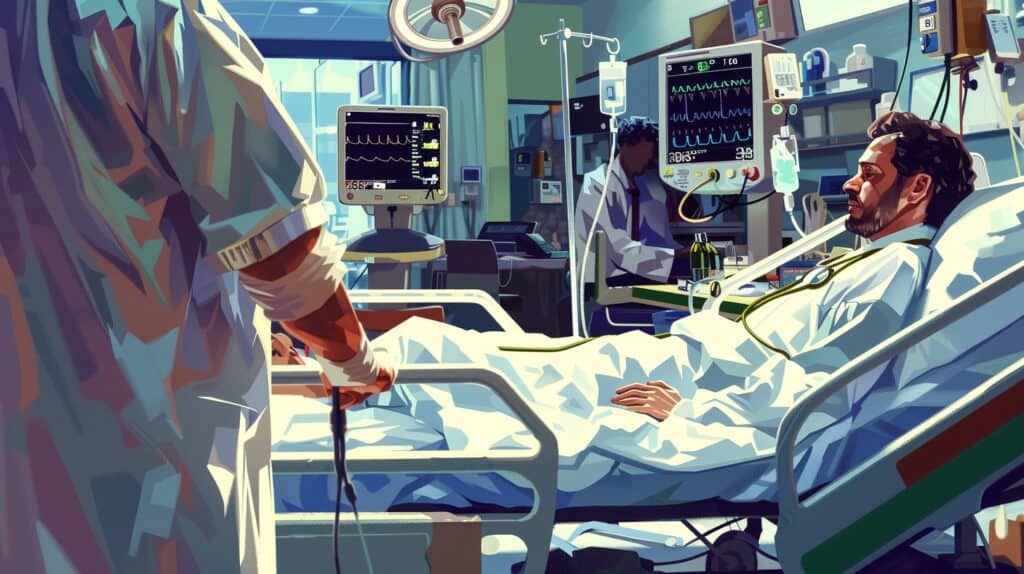Medical malpractice and negligence often confuse patients seeking justice for healthcare errors. These legal concepts, while related, have crucial differences. Understanding these distinctions is vital for anyone facing potential medical harm.
This article breaks down 5 key differences between malpractice and negligence, empowering you to navigate the complex world of medical liability. 2
Let’s explore the critical factors that separate these two legal concepts. 3
Key Takeaways
Medical malpractice involves healthcare professionals knowingly disregarding protocols, while negligence refers to unintentional mistakes or carelessness.
Malpractice cases require proving four conditions: breach of standard of care, damages, doctor-patient relationship, and causation, whereas negligence cases focus mainly on breach of duty of care.
Legal consequences for malpractice are typically more severe, including possible license revocation and criminal charges, while negligence usually results in civil lawsuits with lower penalties.
Time limits for filing malpractice claims are often shorter, such as Pennsylvania’s two-year statute of limitations, compared to generally longer periods for negligence cases.
The U.S. leads in medical negligence research with 96 publications and 1,735 citations, while Harvard University tops malpractice research with 762 citations from 9 publications.
Table of Contents
Defining Medical Negligence and Malpractice

Medical negligence happens when healthcare providers fail to meet expected care standards. Medical malpractice occurs when this negligence causes harm to patients.
Explaining Medical Negligence
Healthcare professionals owe patients a duty of care. Negligence occurs when this duty is breached through carelessness or incompetence. Doctors, nurses, and other medical staff must provide treatment that meets accepted standards.
Failure to do so can result in patient harm or death. According to the lawyers at Oberheiden, negligence cases often involve misdiagnosis, medication errors, or surgical mistakes.
Medical negligence is a significant public health concern, affecting patient safety and leading to potential harm or death. 1
Patient safety deficiencies are a global issue recognized by the World Health Organization. The U.S. leads in medical negligence research output. To prove negligence, patients must show the healthcare provider failed to meet the standard of care.
This requires expert testimony from other medical professionals. Compensation may cover medical expenses, lost wages, and pain and suffering. 2
Defining Medical Malpractice
Medical malpractice occurs when healthcare professionals knowingly disregard proper protocols, causing harm to patients. 3 This serious breach goes beyond simple mistakes, involving a failure to meet established standards of care.
Surgeons performing operations without crucial pre-op tests exemplify such negligence, potentially leading to severe injuries or complications.
Proving malpractice requires demonstrating a clear link between a doctor’s actions and resulting harm. These cases often involve substantial damages due to life-altering impacts on patients.
Harvard University leads research in this field, with 762 citations from 9 publications. 1 The most cited paper, “Relation between Malpractice Claims and Adverse Events Due to Negligence,” highlights the importance of understanding malpractice in improving patient safety.
Distinctive Aspects of Medical Malpractice vs. Negligence

Medical malpractice and negligence differ in key ways. Malpractice involves a breach of professional standards, while negligence can occur without specific medical expertise.
Comparing Intent and Standard of Care
Intent and standard of care distinguish medical malpractice from negligence. Professionals face different legal consequences based on these factors. 2
| Intent | Standard of Care |
|---|---|
| Malpractice: Aware of risks, disregards protocols | Malpractice: Fails to meet expected professional standards |
| Negligence: Unintentional mistake or oversight | Negligence: Falls below reasonable care level |
| Malpractice: Higher degree of culpability | Malpractice: Stricter evaluation of actions |
| Negligence: Lower level of fault | Negligence: More lenient assessment of conduct |
Duty of care forms the basis for both malpractice and negligence cases. Healthcare providers must uphold safety protocols and provide appropriate treatments. Standards vary based on individual patient conditions. Timely diagnosis and adherence to safety measures are crucial responsibilities. Legal obligations exist between patients and healthcare professionals. Courts consider these factors when determining fault in medical error cases. 4
Examining Legal Outcomes and Consequences
Legal outcomes and consequences differ significantly between medical malpractice and negligence cases.
| Aspect | Medical Malpractice | Medical Negligence |
|---|---|---|
| Penalties | Severe, including license revocation4 | Varies by industry, often less severe |
| Legal Actions | Criminal charges possible for gross negligence | Typically civil lawsuits5 |
| Financial Liability | Higher, covering medical expenses, lost wages, pain and suffering | Lower, often limited to direct damages |
| Proof Required | 4 conditions: standard of care breach, damages, relationship, causation | Simpler to prove, focus on duty of care breach |
| Time Limits | Specific statutes, e.g., 2 years in Pennsylvania | Generally longer statutes of limitations |
Malpractice cases demand stricter proof and carry heftier penalties. Healthcare providers face potential career-ending consequences. 4 Patients receive broader compensation in malpractice suits. Time constraints for filing claims are tighter in malpractice cases. Negligence cases often result in less severe outcomes for professionals.
Case Studies: Malpractice and Negligence in Medicine

Real-life examples show the stark differences between malpractice and negligence. A surgeon amputating the wrong limb is malpractice, while a nurse forgetting to record a patient’s medication is negligence.
Surgical Errors and Medical Malpractice
Surgical errors represent a serious form of medical malpractice. These mistakes can lead to devastating consequences, including unnecessary amputations, wrong-site surgeries, or operating on the wrong patient.
A prime example involves a surgeon proceeding without essential pre-operative tests, resulting in patient harm. Such negligence breaches the expected duty of care and can prompt legal action.
Relation between Malpractice Claims and Adverse Events Due to Negligence stands as the most cited paper in medical malpractice research, with 521 citations. 1
Harvard University leads in this field, boasting 762 citations from 9 publications. The U.S. dominates medical negligence research, producing 96 publications with 1,735 citations. These statistics underscore the critical need for improved surgical protocols and heightened awareness in the medical community to prevent such life-altering errors. 2
Prescription Mistakes and Medical Negligence
Pharmacists and doctors can make serious errors when prescribing medications. A wrong drug, incorrect dosage, or failure to check for allergies might lead to adverse health effects.
These mistakes often fall under medical negligence. 1 In the U.S., prescription errors contribute significantly to malpractice claims. Patients suffering harm from such oversights may seek compensation through personal injury lawsuits.
Expert witnesses play a crucial role in these cases, testifying about proper medical standards and how they were breached. 6
Legal Framework for Medical Errors

Medical errors can lead to legal action. Different rules apply to malpractice and negligence cases.
Establishing Fault in Malpractice and Negligence Cases
Establishing fault in malpractice cases hinges on proving a healthcare provider’s actions fell below accepted standards. Patients must show a doctor-patient relationship existed, the provider acted negligently, and this negligence caused harm.
Expert witnesses play a crucial role, testifying whether care met professional benchmarks. A medical assistant’s testimony can provide valuable insights into standard protocols and procedures.
Negligence cases focus on unintentional errors or omissions. Fault is established by demonstrating the provider failed to exercise reasonable care, resulting in patient injury. 7 Evidence from medical records, witness accounts, and expert opinions helps build a case.
Compensation may cover medical bills, lost wages, and pain and suffering. Most cases settle out of court, with only 7% going to trial. 1
Legal Time Limits for Medical Claims
Legal time limits for medical claims vary by state and type of case. In Pennsylvania, patients have two years from injury discovery to file a medical malpractice lawsuit. 9
- Statute of Limitations: Most states set a 1-3 year window to file medical malpractice claims after the incident or its discovery.
- Discovery Rule: This extends the filing period if the patient couldn’t reasonably know about the injury immediately. Courts determine when the clock starts ticking. 8
- Minors: Many states toll (pause) the statute of limitations for minors until they reach 18.
- Continuous Treatment Doctrine: In some areas, the time limit doesn’t start until the doctor-patient relationship for that specific issue ends.
- Fraud or Concealment: If a healthcare provider hides evidence of malpractice, courts may extend the filing deadline.
- Wrongful Death: These claims often have separate, shorter statutes of limitations – usually 1-2 years from the date of death.
- Notice Requirements: Some states mandate patients notify providers of intent to sue before filing, shortening the effective time to prepare a case.
- Statute of Repose: This sets an absolute deadline for filing, regardless of discovery. It varies widely, from 3-10 years in different states.
People Also Ask
What’s the main difference between medical malpractice and negligence?
Medical malpractice is a specific type of negligence. It occurs when a healthcare professional breaches their duty of care. Negligence is broader and can happen in any situation.
Can I sue for both medical malpractice and negligence?
Yes, you can. A personal injury lawyer can help. They might file claims for medical malpractice against a doctor and negligence against a hospital.
How does “breach of duty” apply in these cases?
Breach of duty is key in both. For medical malpractice, it’s when a doctor doesn’t meet the standard of care. In general negligence, it’s failing to act as a reasonable person would.
What damages can I claim in medical malpractice vs. negligence?
Both allow for special, general, and punitive damages. Medical malpractice might include more specific health-related costs. Think: ongoing care, prescription drugs, therapy.
Do I need different types of lawyers for each?
Not always. Many personal injury attorneys handle both. But some specialize in medical malpractice. They know the ins and outs of healthcare laws.
How does insurance play a role in these cases?
Doctors have malpractice insurance. It covers medical mistakes. For general negligence, different insurances apply. It depends on where the incident happened – car, home, business.
References
^ https://www.ncbi.nlm.nih.gov/pmc/articles/PMC8156516/
^ https://www.goodrx.com/healthcare-access/patient-advocacy/medical-malpractice-vs-negligence (2022-03-29)
^ https://www.ncbi.nlm.nih.gov/pmc/articles/PMC2628513/
^ https://simonlawpc.com/medical-malpractice/malpractice-vs-negligence/ (2024-02-19)
^ https://lawecommons.luc.edu/cgi/viewcontent.cgi?article=1456&context=annals
^ https://www.ncbi.nlm.nih.gov/pmc/articles/PMC9160317/
^ https://munley.com/allentown/medical-malpractice-lawyer/what-is-the-difference-between-a-medical-error-and-negligence/
^ https://www.ncbi.nlm.nih.gov/pmc/articles/PMC2711199/
^ https://pa4law.com/medical-negligence-vs-medical-malpractice-understanding-the-legal-difference/ (2023-06-26)




